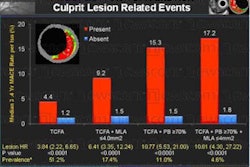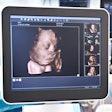NEW YORK CITY - GE Healthcare of Chalfont St. Giles, U.K., this week launched a new handheld ultrasound scanner, called Vscan, designed in part to help primary care doctors diagnose patients.
Jeffrey Immelt, GE chairman and CEO, introduced the product as part of a briefing held on October 21 to provide an update on the status of the company's healthymagination campaign. Immelt told the audience that Vscan represented "a product that showed how innovative technology could develop more affordable products that detected illness and could influence prevention."
Vscan opens in a clamshell-style manner to reveal a small screen on the top half and a circular button pad on the bottom. It is designed for use with a small attached wand but does not have Wi-Fi access for wireless transmission of images. GE did not provide information about suggested price or availability, but the company did mention that the system would be available in 2010.
Immelt said he envisioned that Vscan would also be used in medically underserved countries in Africa and Asia.
The press briefing also touched on other recent GE initiatives, such as the company's proposed acquisition of extremity MRI developer ONI Medical Systems of Wilmington, MA; the issuance of the first of $25 million in grants from the GE Foundation to health centers in underserved communities; and the launch of a new healthcare decision-support tool developed in collaboration with Medicalis of Kitchener, Ontario.
Finally, the company discussed a significant advancement in cancer research resulting from its collaboration with Eli Lilly of Indianapolis. A joint research team developed tissue-based biomarker technology that can simultaneously map more than 25 proteins in tumors at the subcellular level, an important step in the development of personalized and more effective cancer treatments.
GE researchers have built a prototype system capable of staining, washing, and restaining tissue samples for study under a digital microscope. The system combines image analysis of cancerous cells and structures with GE's patented visualization tools to provide a color map of protein concentrations within the sample.
The companies announced plans to extend their research agreement to include the study of four Lilly oncology molecules that are currently in the company's development pipeline. While the technology is expected to help in the analysis of all cancers, the two companies will perform specific investigations in breast, ovarian, lung, and possibly gastric cancers.
Related Reading
GE forms $250M healthcare equity fund, October 22, 2009
GE to buy extremity MRI firm ONI, October 21, 2009
GE debuts decision-support tool, October 21, 2009
Class-action lawsuit hits Cedars-Sinai, GE over CT dose, October 20, 2009
GE signs Vermont facility as showcase, October 20, 2009
Copyright © 2009 AuntMinnie.com



















